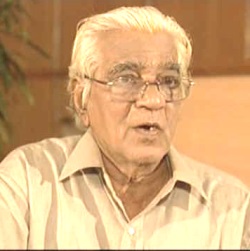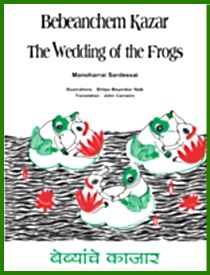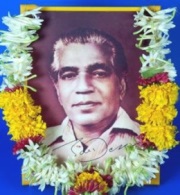A truly cosmopolitan Goan poet
 Where do I begin when it comes to encapsulating the many talents, and wonderful qualities of mind and heart of a great Goan like Dr. ManoharRai SarDessai? Of a much loved poet who was honoured with the titles Lok Kavi (the people’s Poet) and Konknni Kaviraj (the Prince of Konkani Poets)? A formidable linguist who wrote in Konkani, English, French, Marathi, and Portuguese, a staunch nationalist and lover of Konkani, a gifted poet who chose to write predominantly in his mother tongue Konkani, could write with ease in both Romi and Nagri scripts, and published many of his works in both these scripts so his work could be accessed by all his fellow Goans… Manoharbab was all this and more.
Where do I begin when it comes to encapsulating the many talents, and wonderful qualities of mind and heart of a great Goan like Dr. ManoharRai SarDessai? Of a much loved poet who was honoured with the titles Lok Kavi (the people’s Poet) and Konknni Kaviraj (the Prince of Konkani Poets)? A formidable linguist who wrote in Konkani, English, French, Marathi, and Portuguese, a staunch nationalist and lover of Konkani, a gifted poet who chose to write predominantly in his mother tongue Konkani, could write with ease in both Romi and Nagri scripts, and published many of his works in both these scripts so his work could be accessed by all his fellow Goans… Manoharbab was all this and more.
His scintillating poetry reflected the essence and ethereal beauty of Goa and espoused a commitment to Goenkarponn (Goan-ness). Educated in Goa, Bombay, and France, Manoharbab was well versed in western literature. But his writing was rooted in the ethos of his homeland even as the tenets of liberalism, harmony, inclusiveness, and humanism it advocated were universal.
As the title of one of Dr. SarDessai’s Konkani poems Aum Goencho ani Goencho Bhailo suggests, while he was a devoted and loyal son of Goa, he also saw himself as a part of the international community and the human race as a whole. So though he expressed his thoughts on diverse topics through his own elegant poetry, he also tried to introduce Goans to the rich literature of international writers. He translated several French literary works into Konkani, some of them being the plays of Molière, and La Vie de Vivekananda (The Life of Vivekanand) by the well known French writer Romain Rolland.
But one of the last significant works he accomplished before he passed away in 2006 was translating the seminal work of another great Goan – Abbé Faria. De La Cause Du Sommeil Lucide (Of the Cause of Lucid Sleep) – the French book of this 18th century pioneer of modern hypnosis was translated into English for the first time in 2004 by Manoharbab.
The blossoming of a Konkani poet
Dr. ManoharRai SarDessai was born in Goa on 18 January, 1925. After completing his early education there, he obtained his B.A. and M.A. degrees from Bombay University with a First Class First in both! Later on, he won a scholarship from the French Government and proceeded to the Sobornne University in Paris for acquiring a Ph.D. in French Literature. Manoharbab taught French at colleges in Bombay and Goa, and was also appointed Head of the newly established French Department of the Goa University.
Dr. ManoharRai’s father was the eminent Goan short story writer Laxmanrao Sardessai who had penned over 700 stories in Marathi and was also fluent in Konkani, Portuguese, and French. As the son of an accomplished writer like Laxmanrao, Manoharbab was exposed to literary influences right from childhood and it is therefore not surprising that he took to creative writing himself.
ManoharRai’s six years or so in Paris added a new dimension to his poetic vision, but this separation from his homeland also evoked a deep yearning for the lush paddy fields, swaying palms, and sun-kissed sands of Goa. He missed the sweet ringing of temple and church bells and the voices of fellow Goans. And so, the poems he wrote there were poems of nostalgia – odes to the abundant natural beauty of his beloved Goa.
A Konkani People’s Poet
Like his contemporaries, the distinguished poets Bakibab Borkar and R. V. Pandit, Manoharbab had grown up in a Goa where Hindus and Catholics fought shoulder to shoulder as fellow Goans for opposing colonial rule and for the revival and official recognition of the Konkani language. He understood very well the dangers of such longstanding communal harmony being disturbed.
To urge Goans to continue fighting unitedly for the recognition of their mother tongue Konkani and the protection of their Goan-ness cutting across barriers of religion and script, he published a collection of his early poems titled Goenya tujea mogakhatir (Goa, for the love of you!) in 1961, and a few years later another exquisite collection – Zayat Jage (Wake up!).
Two of his other important collections include Pisollim for which he won the Sahitya Akademi Award and Zayo-Zuyo. Both these featured an innovative form of mini poems. Here’s a sample of his sparkling wit as expressed in his short Konkani poems:
Deva kasli tuji karni;
Kens zale dhove, nazar azun torni.
(O God, the paradox of the work of your hands;
Hair already white with age, but the mind still youthful.)
 The Konkani daily Sunaparant carried Manoharbab’s witty 4-liners titled ‘Tikli’. These were a fine example of how a wealth of wisdom could be expressed through an economy of words.
The Konkani daily Sunaparant carried Manoharbab’s witty 4-liners titled ‘Tikli’. These were a fine example of how a wealth of wisdom could be expressed through an economy of words.
Dr. SarDessai also published six collections of poems for children. Many of his Konkani poems like Bebeanchem Kazar (The wedding of the frogs) and Ganvchea matari ghe, tum khuim ghe geleli? (Dear grandmother from our village, where had you gone?) are taught in schools in Goa. His book A History of Konkani Literature From 1500 to 1992 is a painstakingly researched study of the origin and evolution of the Konkani language and includes the profiles of the pioneers and stalwarts of Konkani literature.
Many of ManoharRai’s poems have been set to music. Some of them like Sobit Amchem Goem (How beautiful is our Goa!), Zayat Zage, and Goenchea mhojea Goenkarano (My fellow Goans of Goa) were used extensively during the run-up to the 1967 Opinion Poll for rallying Goans towards voting against merger with Maharashtra.
His songs, poems, and plays were broadcast over All India Radio (Goa, Bombay, and Pune), and aired on TV channels such as Doordarshan in India, and even on Paris TV.
But one of his most emotive poems is the well-known Otthra Jun (18th June) commemorating the civil disobedience movement launched in Goa by Dr. Ram Manohar Lohia and Dr. Juliao Menezes on that day in 1946. The passionate appeal for unity among Goans expressed through the lines ‘Bhava, tuka iad assa Otthra Jun?’ (My brother, do you remember the 18th of June?) repeated several times in the poem is unmistakeable. Check out a few more lines:
Mongllaracho aslo dis
Pavs nettan poddttalo.
Ambeamullant gavddeapor
Kuddkuddot roddttalo.
(It was a Tuesday,
Heavy rains lashed the earth.
Beneath a mango tree, a Gavddi boy
Stood shivering and weeping. )
Kitle oxe aile gele
Otthra Jun!
Ambeamullant kuddkuddtta
Gavddeacho por ozun!
Bhangarachem Goem amchem
Kitlem asa pois ozun!”
(So often it has come and gone
The 18th of June!
The Gavddi-boy
Still shivers beneath the mango tree.
A golden Goa of our own
How far from us is it still?)
Tea disa ugddasan
Hodd’ddem mhojem pett’ta oz.
Bhava tuka iad asa
Otthra Jun?
(Each year on that day without fail,
My heart is set aflame.
My brother, do you remember,
The 18th of June?)
Under Dr. ManoharRai SarDessai’s initiative, the four-volume Konkani Encyclopaedia was published by the Goa University. ManoharRai was the president of the Konkani Bhasha Mandal, the Vice-President of the Goa Konkani Akademi, and the recipient of several awards such as the Goa Kala Akademy Award and the Goa State Cultural Award besides the Sahitya Akademi Award (1980). He also served as a member of the Executive Board of the Sahitya Akademi.
Besides, he was one of the founders and a life member of Alliance Francaise de Goa. In 1988, the French Government conferred the title “Chevalier de L’Ordre des Palmes Academiques” on Manoharbab for his efforts towards the spread of the French language and culture in Goa.
A legendary, multi-lingual poet passes away
 ManoharRai SarDessai, the “Prince of Konkani Poets” whose work had influenced a number of talented younger Goans, passed away on 22 June, 2006, after a brief illness, and all of Goa was plunged into sorrow.
ManoharRai SarDessai, the “Prince of Konkani Poets” whose work had influenced a number of talented younger Goans, passed away on 22 June, 2006, after a brief illness, and all of Goa was plunged into sorrow.
Dr. SarDessai was a celebrated poet and a well-known, much-in-demand personality. Yet, he was remarkably unassuming and gentle by nature. Our beloved Manoharbab may have passed into the annals of history, but we Goans can keep his legacy alive as long as we remember what he wrote in his poem Sobit Amchem Goem:
“Mekhlleponnachem, Munisponnachem, Sopon bangarachem, Goem!”
(Upholding freedom, and humaneness, A golden dream – Goa!)
Now something that will surely tug at the heartstrings of any Goan…
Goenchea mhojea Goenkarano – music and vocals by Ulhas Buyao
And this: Sobit amchem Goem
Viva Goa!

Hello ma’am, I loved this article. Would you know where I could get hold of his poetry books and also the book on the history of Konkani literature?
Glad you liked the post. But I’m sorry, Bhuvanesh. You’ll have to try contacting bookstores and libraries in Goa for the information you require. Many of them have websites nowadays for reaching out to customers.